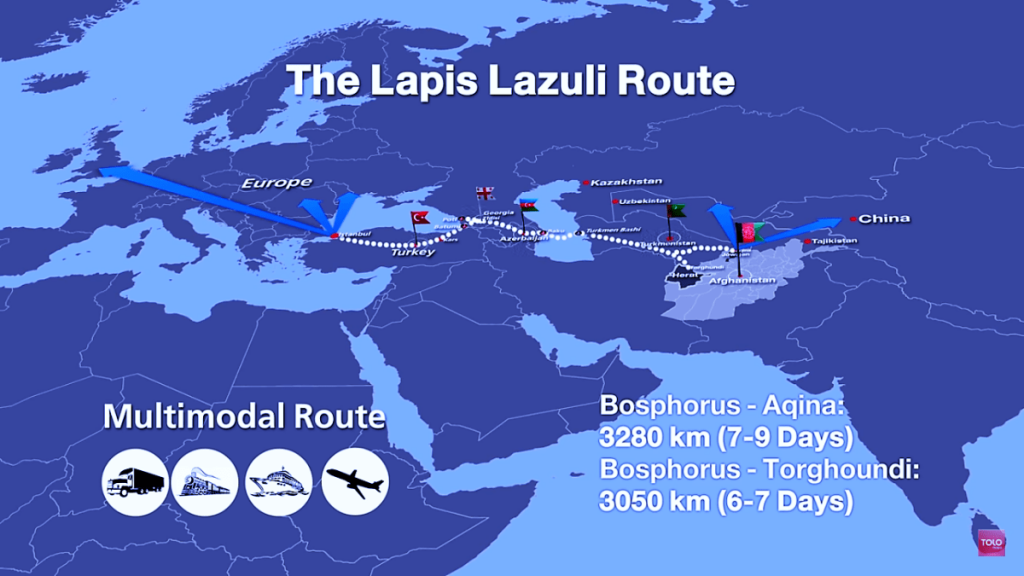
Geopolitically and geo-economically, Afghanistan is located in a subtle part of the globe connecting Central Asia to South Asia and to the Middle East. The exceptional location, widely famous as the Heart of Asia provides important economic opportunities for the growth of trade and transit, connection of markets, interactions among large cities, and for the socio-economic development of the region.
In recent years, Afghanistan has sought a strategic approach to fulfilling its geopolitical and geo-economic role through creation of mutual interest and regional connectivity. It is expected that this approach will not only strengthen the mutual dependency in the region, but also help in building trust among regional countries and in the long run be effective in solving the political and security challenges of Afghanistan.
To some extent, Afghanistan has been able to present its historical position and role as a land bridge of transit and trade crossroads of countries in the region through a series of measures, such as strengthening regional cooperation and focusing on economy-oriented foreign policy by joining regional organizations, strengthening multilateral regional dialogues and building regional platforms, such as the Regional Economic Cooperation Conference on Afghanistan (RECCA), the Heart of Asia- Istanbul Process (HoA), long and medium-term regional connectivity projects, such as energy transmission projects from Central Asia to Pakistan and India via Afghanistan and railway and road projects, including the Lapis Lazuli.
The Lapis Lazuli route is one of Afghanistan’s most important projects, which connects Afghanistan to the international markets. The Lapis Lazuli Agreement was signed on the sidelines of the 7th (RECCA) Summit on November 15, 2017 in Ashgabat, Turkmenistan between Afghanistan, Turkmenistan, Azerbaijan, Georgia and Turkey. This agreement provides the base for strengthening economic cooperation and facilitating trade, transit, transport and slot gacor hari ini customs issues using advanced technologies between member countries. This agreement is not limited to transfer of commercial goods, but also passengers and vehicles.
Lapis Lazuli route starts from the ports of Aqina (Faryab province) and Turghundi (Herat province) of Afghanistan situs deposit qris and reaches to Baku, the capital of Azerbaijan, through Caspian Sea and Turkmenbashi port of Turkmenistan. The road continues to Tbilisi, Georgia. Crossing Poti and Batumi ports in Black Sea, it reaches Turkeys Sea Ports in Istanbul and eventually leads to High Seas in Europe.
Considering the current existent infrastructures, railways, standard Link Sbobet roads and the presence of ports in this route, Lapis Lazuli is considered as one of the most suitable trade and transit routes between Afghanistan and Central Asian countries, Caucasus, Balkans and slot gacor Central Europe. This corridor will not only help Afghanistan to access various transit routes and seaports, but also provide an opportunity to increase the export from Afghanistan to other member countries and the European markets. In addition, access to this project will reduce Afghanistan’s dependence on other routes influenced by political factors. The expansion of Lapis Lazuli route through Afghanistan to South Asia is also of strategic importance.
Turghundi port in Herat province of Afghanistan is the closest route to connect Pakistan to Lapis Lazuli. Pakistan’s access to Central Asian and Lapis Lazuli route countries, and Afghanistan’s reciprocal access to Pakistan’s ports will help expand the regional trade and transit between the north and south of Asia. India can also join the route through the ports of Turghundi and Chabahar. Therefore, Lapis Lazuli route can be one of the most important slot88 initiatives of the economic growth in the region centered on Afghanistan.
The project has not yet been slot depo 25 bonus 25 fully implemented. The signing of the project’s agreement, contrary to the expectations, does not mean the implementation of this plan; rather, its immediate exploitation requires a series of important actions by Afghanistan and other members, the most important of which are:
- Afghanistan has not yet acceded to the Vienna International Conventions (1968) on Roadmaps, Traffic Signs and Signals. However, other members of the route have long acceded to these conventions. It should be noted that accession to the Vienna Conventions alone is not enough; it requires Afghanistan to take practical steps to implement articles of the conventions.
- Afghanistan needs to sign a number of bilateral agreements on road transport facilities with the member countries of the Lapis Lazuli route. Similarly, Afghanistan needs to sign protocols on visa and rail transport facilities with the member countries slot jp maxwin of the Lapis Lazuli project to pave the way for its full implementation.
- Afghanistan’s accession to treaties such as the Kyoto Convention on the Simplification and harmonization of Customs Procedures, the International Convention on Rail Transfers (COTIF), the International Agreement on the Transfer of Dangerous Goods by Road (ADR) and the convention on the contract for the international carriage of goods by road (CMR), not only will facilitate the implementation of the Lapis Lazuli project; but in the long run, is essential for Afghanistan as a transit bridge for Central and South Asia.
In December 2018, Afghanistan sent the first shipment of exported goods via the Lapis Lazuli route to Turkey through the port of Turghundi, with the aim of assessing the cost of transporting goods and taking steps to encourage member countries to implement the project. In April 2019, a group of Afghan cyclists also cycled this route to support the Lapis Lazuli project and to send a message slot of friendship and peace from the people of Afghanistan to the member countries of the agreement. Full operation and implementation of the Lapis Lazuli project requires a series of legal and structural measures, the main points of which were mentioned above. Addressing the above issues is a major precondition bonus new member 100 for the implementation of the Lapis Lazuli route and opening of Afghanistan’s transit potential, economic and trade opportunities and its connection to regional and global markets.
Translated by: Siyar Ayoubi
Seddiq Rasuli is the Acting Director of Economic Relations at the Ministry of Foreign Affairs of Afghanistan. He has previously served as a diplomat at the Permanent Mission of Afghanistan to the United Nations in New York.
